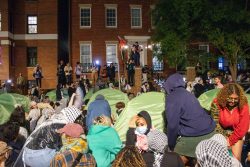The English Department has changed the structure of its major, raising some questions as to how the curriculum will continue balance the Western canon with literature courses that deal with diversity and minorities.
Compounding the issue was a vote against including a statement in the new curriculum guidelines mandating that all departmental courses “address the importance of diversity” in race, religion, class, sex and gender. The vote, taken in December, was 19 to 17 against the statement, according to a memo issued by the department chair, Joseph Sitterson.
The vote does not mean the department opposes teaching courses about diversity in literature, Assistant Professor Ricardo Ortiz said. Ortiz said he voted against the statement because its language applied only to teaching the so-called Gateway courses?the four courses that students will have to take before enrolling in advanced classes.
Ortiz said he would consider introducing a statement that covered all the department’s offerings. He said it would be a way of affirming what he said is already a commitment to teaching courses about diversity in literature.
Most professors’ votes are unknown because the decision was made by secret ballot.
Professor Angelyn Mitchell, who helped write the statement, said the diversity statement could have effectively served to “highlight a position of inclusiveness” within the department.
But Mitchell said the vote would not detract from the quality of English courses.
Both Ortiz and Professor Gay Cima said that the faculty’s commitment to diversity was strong with or without the statement.
The diversity statement was one part of the broader proposal for restructuring the curriculum.
Students currently take introductory courses in Critical Reading and Writing and Text and Context. The new structure will replace these two categories with introductory, or Gateway, courses that will be divided into four areas. They are Medieval and Early Modern Literatures and Cultures, 18th and 19th Century Literatures and Cultures, Modern and Postmodern Literatures and Cultures, and Introduction to Critical Methods.
Mitchell said in an interview that the current curriculum worked well and “reflect[ed] accurately the current state of the profession.” She could not be reached for further comment by press time.
Ortiz, who was part of the committee that worked for three semesters on the new curriculum, said that under the current system, professors in advanced courses did not have a clear idea of what students were taught in introductory courses.
“I was teaching a 400-level course and didn’t know if the students had learned about the novel,” Ortiz said.
He said that the Gateway system would better ensure that students majoring in English acquire a common set of skills regardless of what specific courses they take. Ortiz noted that questionaires completed by seniors in the last several years indicated that they were not enthusiastic about the way the major was structured. He said they cited a lack of connection between introductory and advanced classes.
Sitterson said the changes would not limit students’ abilities to take non-traditional courses. He cited examples of courses related to women in medieval literature and 20th century African-American literature which could be taken under the historical categories of the Gateway system.
Ortiz said the University tries to recruit professors experienced in gender and race studies who can also teach these historical periods. He said he expects professors of early modern and 18th century literature to do more “than rehearse the old gestures of the cannon.”
“Nothing makes me think that there’s a retrenchment going on here,” he said.
Sitterson confirmed that Professor Margaret Stetz, currently on sabbatical from Georgetown at the University of Delaware, had written an email that argued that matters of diversity would not be required in English courses after changes in the curriculum. Stetz could not be reached for comment. Sitterson said he did not want to elaborate on what the e-mail said.
In addition to introducing the Gateway courses, the department created new concentrations for English majors. Currently majors concentrate in Studies in Literature and Literary History, Culture and Performance, and Writing: Rhetoric, Genre and Form.




